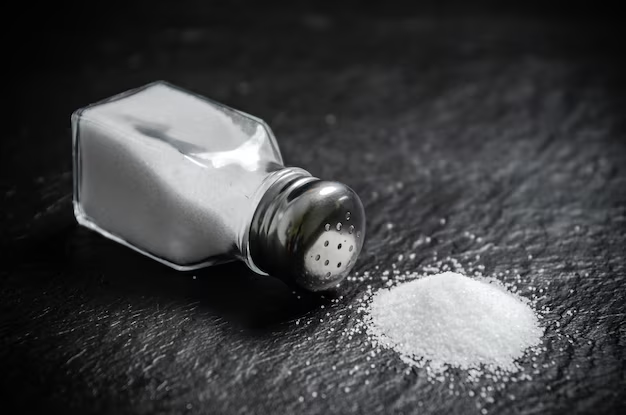Your Guide to Can Salt Cause Hypertension
What You Get:
Free Guide
Free, helpful information about HyperTension FAQ and related Can Salt Cause Hypertension topics.
Helpful Information
Get clear and easy-to-understand details about Can Salt Cause Hypertension topics and resources.
Personalized Offers
Answer a few optional questions to receive offers or information related to HyperTension FAQ. The survey is optional and not required to access your free guide.
Is Salt the Culprit Behind Hypertension? Here’s What You Need to Know
In the world of health and wellness, salt has often been labeled the villain, particularly when it comes to high blood pressure, also known as hypertension. But does salt truly deserve this reputation, or is it simply misunderstood?
Understanding Hypertension and Sodium
Hypertension affects millions globally and is a leading risk factor for heart disease and stroke. Salt (sodium chloride) is essential for bodily functions, such as nerve transmission and muscle contraction. However, too much sodium can lead to water retention, increasing blood volume and subsequently putting pressure on blood vessel walls, which may indeed result in hypertension for some individuals.
The catch is that everyone reacts differently to sodium. While some people, known as "salt-sensitive," may experience significant blood pressure increases with higher salt intake, others may not see much of a change. The American Heart Association recommends no more than 2,300 milligrams of sodium per day, with an ideal limit closer to 1,500 milligrams for most adults, to maintain healthy blood pressure.
Other Contributors to High Blood Pressure
Focusing solely on salt intake might overlook other important factors contributing to hypertension:
Diet and Nutrition: Diets high in processed foods can elevate blood pressure due to their sodium content. A balanced diet rich in fruits, vegetables, and whole grains, such as the DASH diet (Dietary Approaches to Stop Hypertension), can help manage blood pressure.
Physical Inactivity: Regular exercise helps keep your heart strong and maintains healthy blood pressure levels.
Stress Levels: High stress can act as a trigger for temporary blood pressure spikes.
Genetics: Family history plays a significant role in an individual's risk of developing hypertension.
Look Beyond Salt: Holistic Health Approaches
While monitoring your salt intake is wise, tackling hypertension often requires looking at overall lifestyle changes and potential financial support for those without resources for health management tools.
Financial Support and Health Management
Navigating healthcare costs, including medication and healthy food access, can be challenging. Understanding available resources can make a significant difference in managing hypertension effectively.
Government Aid Programs: Programs like Medicare and Medicaid offer health assistance for qualifying individuals. These can help cover medication costs and preventative care services.
Educational Grants: Community programs and larger organizations sometimes provide funding for health education, empowering individuals to make informed lifestyle changes.
Credit and Debt Relief Solutions: For those facing medical bills, exploring debt relief or refinancing options could ease financial pressures. Consider speaking with financial advisors specializing in healthcare-related expenses for tailored solutions.
Community Support Resources: Local food banks, wellness centers, and non-profits might offer guidance or materials to help maintain a balanced diet conducive to heart health.
In summary, while excessive salt consumption may contribute to hypertension in certain individuals, focusing on a holistic approach involving dietary changes, lifestyle modifications, and leveraging available resources can be key in managing blood pressure effectively.
Quick Glance Guide to Financial Assistance and Health Resources:
- 💡 Medicare & Medicaid: Insurance for medical expenses and preventive care.
- 🥦 Supplemental Nutrition Assistance Program (SNAP): Assistance in purchasing healthy foods.
- 📚 Educational Workshops: Access grants for health-focused learning programs.
- 💳 Credit Counseling Services: Discuss options for managing and reducing medical debt.
- 🌱 Local Non-Profits: Look for community-centered health initiatives emphasizing heart health education.
What You Get:
Free HyperTension FAQ Guide
Free, helpful information about Can Salt Cause Hypertension and related resources.

Helpful Information
Get clear, easy-to-understand details about Can Salt Cause Hypertension topics.

Optional Personalized Offers
Answer a few optional questions to see offers or information related to HyperTension FAQ. Participation is not required to get your free guide.


Discover More
- a 66 Year Old Female With a History Of Hypertension
- Are Eggs Bad For Hypertension
- Are Eggs Good For Hypertension
- Are Endocrine Disorders Causing Hypertension Rare
- Can Adderall Cause Hypertension
- Can Alcohol Cause Hypertension
- Can Allergies Cause Hypertension
- Can Anemci People Get Hypertension
- Can Anemia Cause Hypertension
- Can Antibiotics Cause Hypertension
